January 22: Comprehensive identity dogmas

Thinking about what to write for you today, I came perilously close to producing a piece about the connecting lines between a surprising moment of trinitarian theology early in my Evangelical college career, Eve Kosofsky Sedgwick’s influential essay, “Paranoid Reading and Reparative Reading”, and a vague reflection on how I wish we could all think of each other as constantly unfolding assemblages of feelings, beliefs, and body parts rather than as fixed, modern selves.
You will probably agree that it’s for the better I didn’t pursue this idea much further.
Instead, let me just say this. I’ve been talking in therapy recently about my paranoia of becoming static, fixed. The Bene Gesserit were wrong: fear isn’t the mind-killer. Certainty is.
I think this recommendation newsletter is in some ways about never getting too used to the idea of who you are. About giving yourself as many occasions as possible to find your own mind and body surprising. About finding safe and pleasurable ways to say to yourself, “Wow I can’t believe how much I liked that.” We are all of us always becoming something else, whether we want to be or not. Better, I think, to see where our own changing affections might take us than to hold out, rigid and eroded, against our own possibilities.
Read: “How Twitter Can Ruin a Life” by Emily VanDerWerff on Vox

I shared this piece from my personal social media accounts yesterday after I read it, only for my partner to point out it’s nearly a year old. Someone I follow on Twitter had pulled it out of the not-that-distant past and placed it back on my feeds, she having just seen a friend and colleague chased off the Internet after a year of constant Twitter callout.
I don’t want to use this space to engage the questions of “cancellation” and social media alarmism too deeply. But reading this piece for the first time, a year removed from its initial publication, was too impactful not to share. VanDerWerff’s navigation of this material - an awful incident where a trans woman, Isabel Fall, published a short science fiction story that provocatively interacted with a transphobic meme - is compassionate and nuanced. She establishes the unique qualities of Twitter as a platform that seem to empower the “Internet Mob”, while at the same time undermining easy conclusions about what Fall’s experiences can tell us about “The Way We Live Now.” It has helped me better understand my own relationship to ongoing conversations about cancellation, power, and the closet. I’m not sure I’ve read anything in the last few years that has better captured the difficult terrain we have produced online in our search for ever more comprehensive identity dogmas.
Watch: The Golden Kamuy on Crunchyroll

Against my better judgment, I have signed up for an anime watch challenge this year. As fortune would have it, the first show I picked almost at random (I just needed a title that fell under the seinen demographic according to myanimelist.com) has turned out to be a vibrant, textured adventure that introduced me to an indigenous culture I had barely the vaguest awareness of.
The Golden Kamuy is a bloody wilderness adventure story set in the early 20th century, just at the close of the Russo-Japanese war, about an unkillable soldier, Sugimoto, in pursuit of a mysterious cache of gold whose location can only be pieced together with a code that has been tattooed on the skins of fifty prisoners. It’s a satisfying hook, but the heart of the story is really the friendship that develops between Sugimoto and an Ainu girl named Asirpa, who has her own reasons for seeking out the cache. Asirpa is the show’s emotional and spiritual anchor, a vector through which it explores and commemorates Ainu culture, long suppressed and erased by Japanese imperialist nationalism. The show alternates between scenes of tense, survivalist and military action and quiet, attentive sequences of domestic Ainu life. It’s not a perfect show - I’m still trying to make up my mind on how fully it avoids the “noble savage” trope that so often torpedoes these kinds of stories. But there is a strong sense of genuine sorrow and reverence animating the spirit of The Golden Kamuy that has me feeling I’ll stick around for the rest of the show.
Play: Everdell
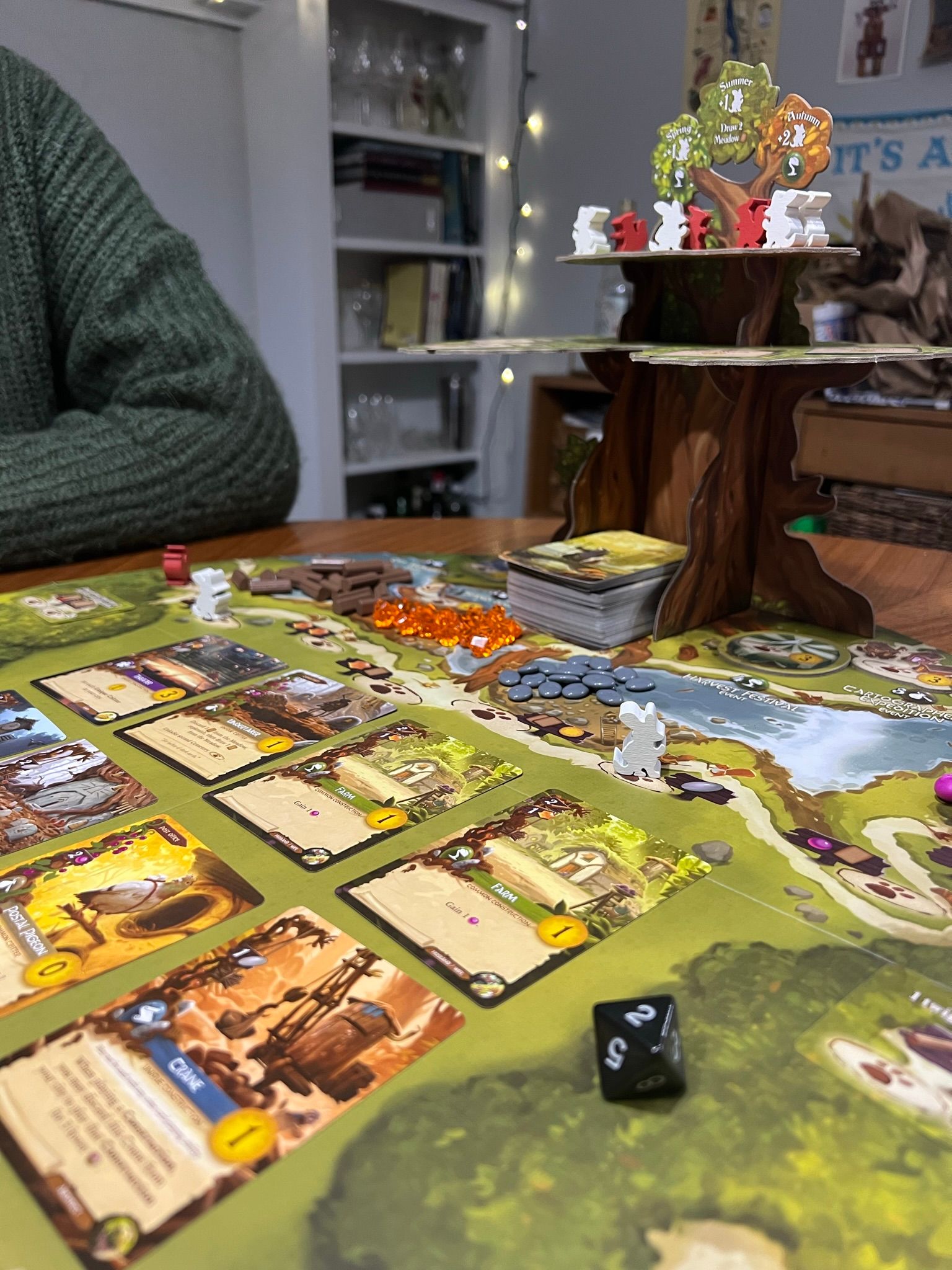
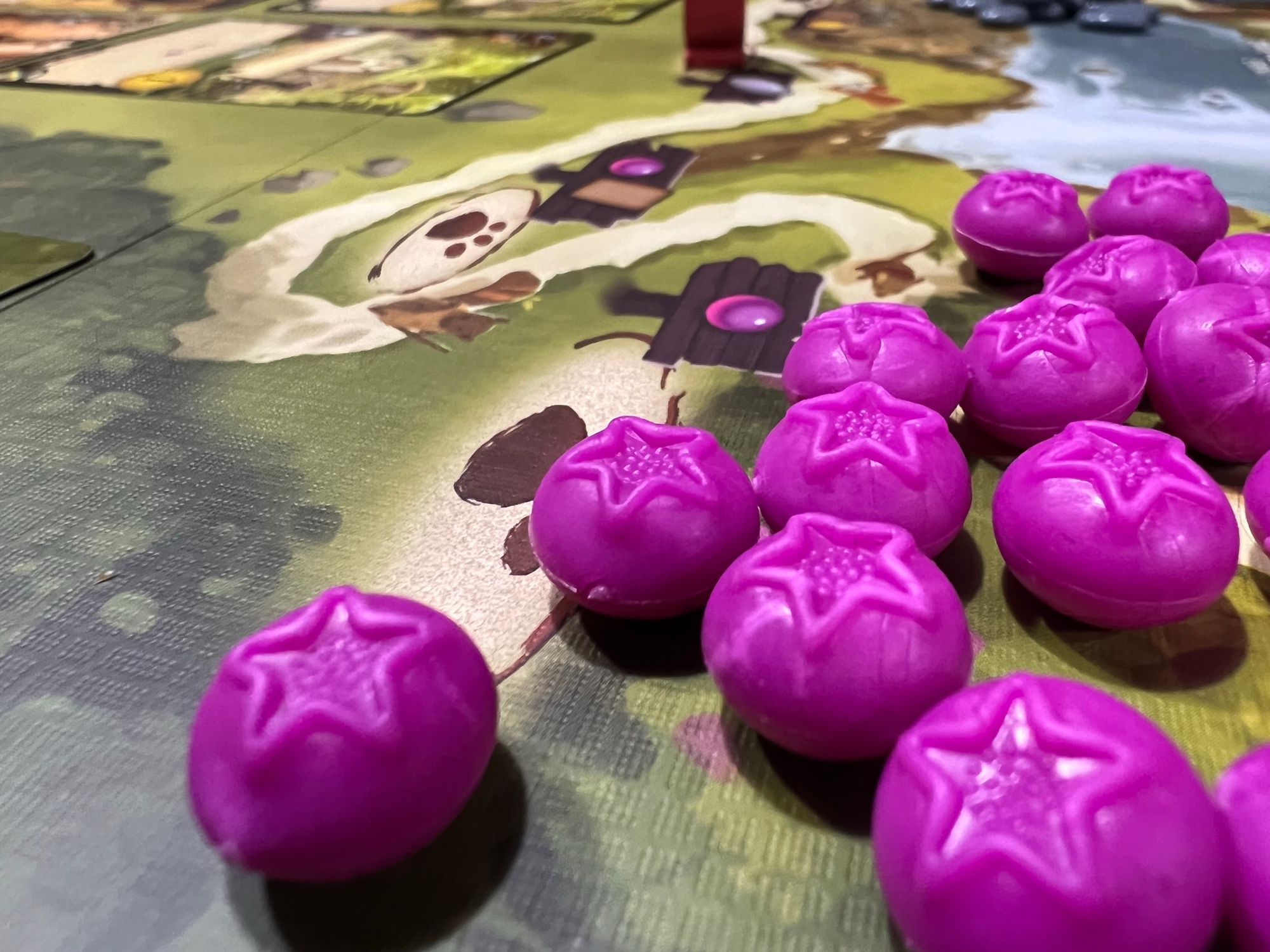
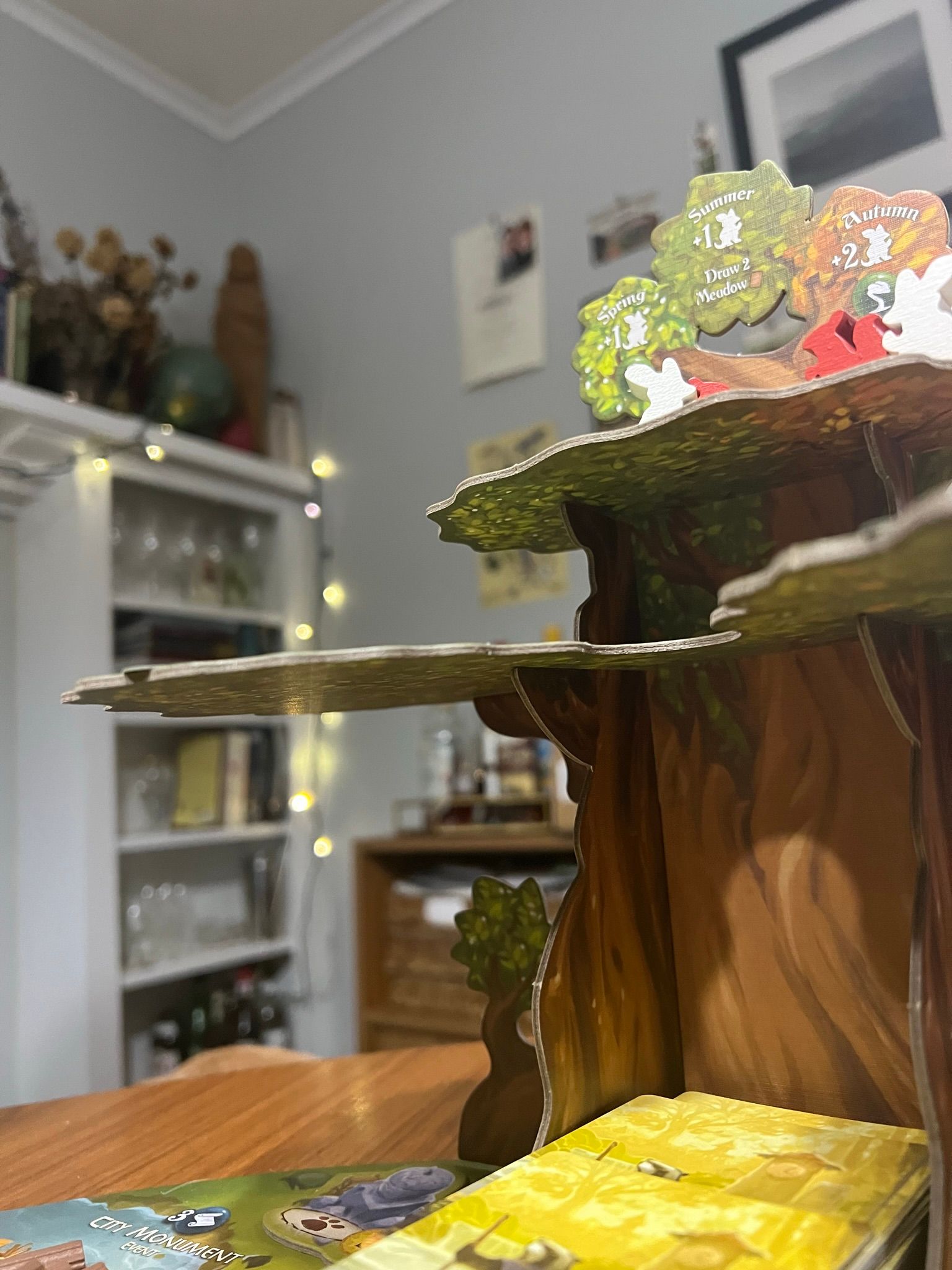
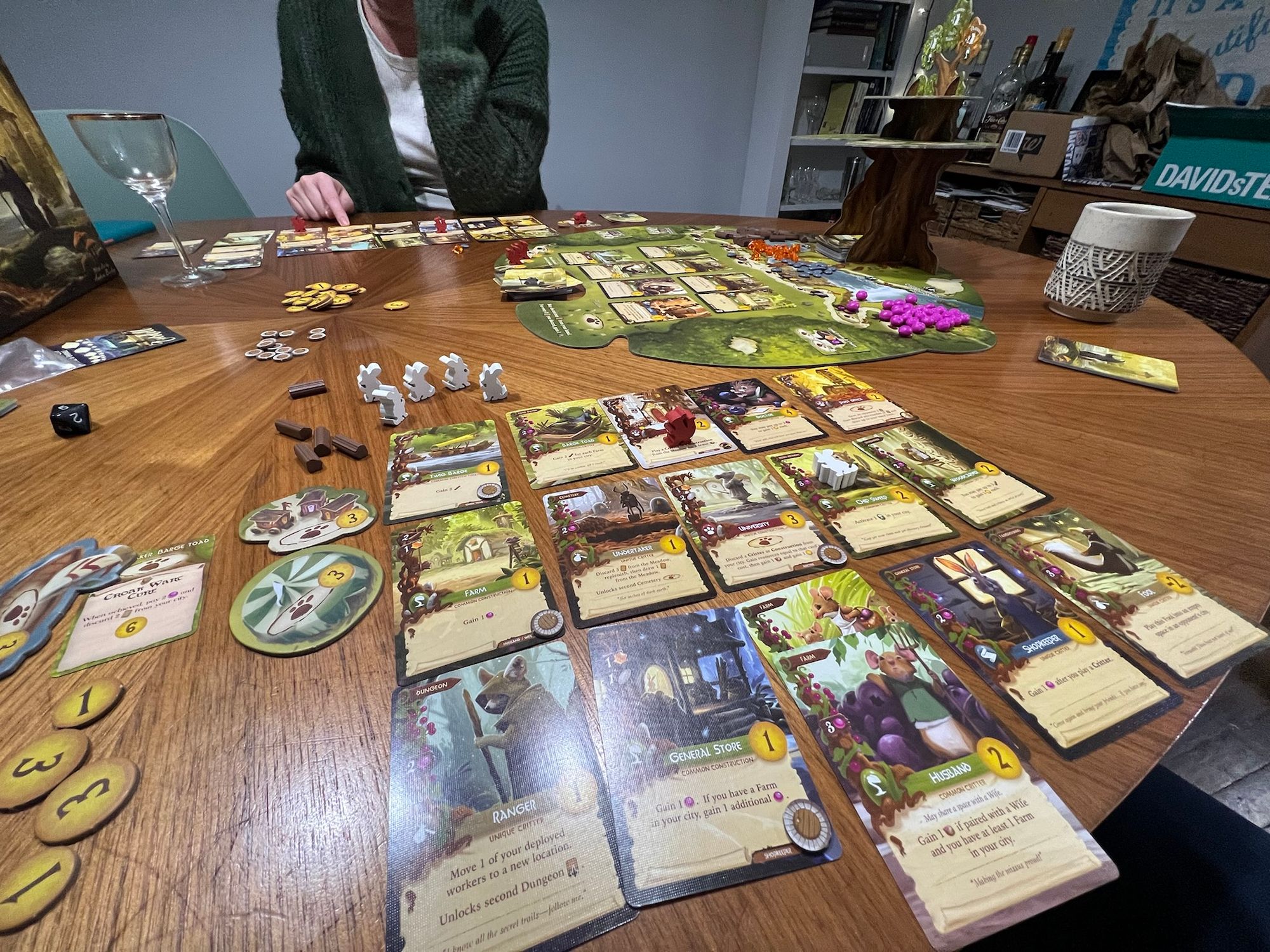
More often than not, my favorite board games stick with me because of their ideas. Not the fictional worlds they evoke, though of course that’s nice to have in spades when you can get it. Not the depth of their strategies, though you love to have a game that can stand up to many, many plays. It’s the way board games fit a series of rules together that gets me. That’s where the imaginative space of board games lies: in the tension and pleasure they create by simply telling you what you can and cannot do with these pieces of plastic and paper.
Everdell, for all its charming production (look at that cardboard tree!) and art (look at those adorable squirrels!) is a triumph of ideas. At its heart, it’s the kind of game hobbyists refer to as a “tableau-builder”. Over the course of a game you play cards in front of you, creating a “tableau” of interacting creatures and locations that, if fit together just right, become a fountain of actions, victory points, and storytelling. But it also features ideas from a dozen other kinds of games: worker placement games like Agricola, combo-heavy games like 7 Wonders, and resource management games like Catan, just to mention a few. And it does this all while staying firmly in that nice middle-weight territory, helped along by the irresistible approachability of its Redwallesque setting. If you’re a fan of the tabletop hobby, or if you’d like to give the scene a shot, I highly recommend picking this one up. It’s a keeper.
Caprisongs by FKA Twigs.
Since her debut full length debut, LP1, in 2014, FKA Twigs has been a mainstay of the alternative r&b and avant-garde pop spaces, helping to define one of the contemporary music scene’s most dynamic sub genres. Since then her music has been a consistent touch point for listeners curious about the weirder edges of pop music. While I’ve always enjoyed what FKA Twigs puts out, for me her music has been more of a cultural waypoint than a playlist mainstay. By which I mean I’m always going to check in with what FKA is doing because it’s always an interesting bellweather for the landscape at large, but I rarely put her shit on repeat.
Until now.
Caprisongs is far from her most conceptual or intellectual work, but that looseness turns out to be this record’s advantage. This mixtape sees FKA Twigs at her catchiest, slinging hooks and choruses that combine into bewitching little earworms built from glitchy electronic textures. Her feature list is extensive and all over the place, and everyone has come correct, giving impressively consistent performances that always serve the song above anything else. This collection of tracks is the best possible introduction to an artist whose impact on contemporary r&b, electronic music, and neo-soul is becoming hard to overstate.
One more week to go and we'll be done with January. Next month The Crossover Appeal turns a year old. Excited to share some new things with you then. In the meanwhile, thanks for reading. Be well.
Jordan Cassidy





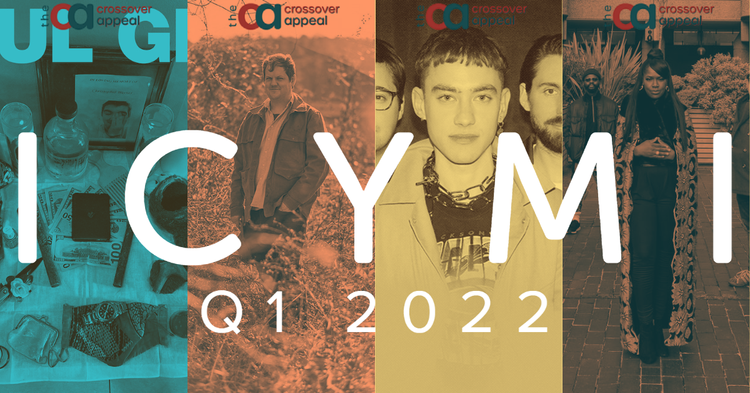

Member discussion